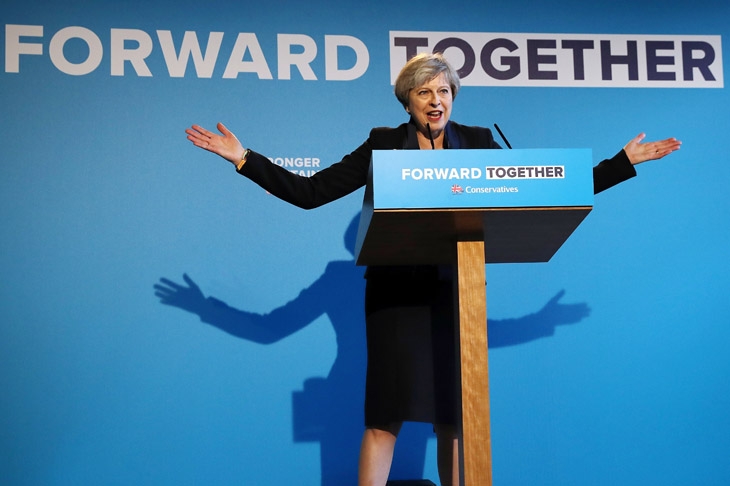J.L. Carr’s classic novel How Steeple Sinderby Wanderers Won the FA Cup (1975) contains a character named Arthur Fangfoss. Mr Fangfoss is a rural tyrant who, when standing for the local council, limits his election address to a pithy eight words: ‘If elected, I will keep down the rates.’ No such brevity, alas, attends the 2017 manifestos of the UK’s three main political parties. The shortest of them — the Lib Dems’ Your Chance to Change Britain’s Future — weighs in at over 80 pages, while Labour’s For the Many, Not the Few extends to a well-nigh novella-length 23,000 words.
The Conservatives’ Forward, Together is not that much shorter and took several minutes to download (for some reason it seems impossible actually to buy a party manifesto these days. No bookshop in my home city of Norwich was stocking any, and the local Labour councillor from whom I requested a copy of For the Many, Not the Few seemed puzzled that anyone should want one). Each is attractively produced, professionally laid out, and harbours a wide range of illustrations. But how do they shape up as pieces of writing? Would anyone read them who was not absolutely compelled to do so? And if not, why not?
Sensitive literary types very often turn highly agitated in the presence of party manifestos. The ur-text nearly always invoked for purposes of comparison is George Orwell’s essay Politics and the English Language (1946), with its diagnosis of a ‘special connection between politics and the debasement of language’. Orwell’s conclusion, back at the onset of the Cold War, was that political orthodoxy seemed to require ‘a lifeless, imitative style’, and that modern political writing was largely ‘a defence of the indefensible’ in which the callousness of authoritarian regimes was rendered slightly more acceptable by being dressed up in seemly cliché.
If the modern party manifesto is certainly keen on a lifeless, imitative style, then comparisons with Orwell’s gulag apologists (one of whom remarked that ‘the Soviet regime exhibits certain features which the humanitarian may be inclined to deplore’) are exaggerated. It is not so much that the modern politician wants to tell lies in public, simply that he or she has succumbed to the two great devitalising influences that have been busy undermining written language over the past 30 years. One of them is the rise of business jargon and the bromides of the company report. The other is the general collapse of educational standards that has robbed nearly everybody in a position of power of the ability to write decent English.
On the plus side, little in Change Britain’s Future, For the Many, Not the Few or Forward, Together is actively illiterate. The apparatchiks who wrote them (and from all three documents rises the scent of something laboriously put together by committee) clearly know how to arrange words on a page; grammatical rules have mostly been followed (I was particularly impressed by the sentence in Forward, Together that runs ‘For too many people, where you end up in life is still determined by where you were born and to whom’); there is even, on rare occasions, the fleeting sense of an individual style surfacing above the collective wave. But the effect of reading more than a few paragraphs is of wading through lexicographical treacle, attempting to discern meaning in a landscape where cliché, repetition and tautology pile up on either side of the path like so many windfall apples.
And so, after only a page or so, the reader cries out for mention of a job which isn’t ‘cutting edge’, hankers after an institution which doesn’t merit the description ‘not fit for purpose’, and positively yearns for a situation which isn’t liable to create ‘burning injustices’. Worse, perhaps, than the stock phrase, which even Man Booker winners sometimes struggle to avoid, is the constant verbosity, the feeling that seven or eight words are being used when sometimes two or three would do. ‘Taxation is what underpins our shared prosperity’, the Corbyn team declares at one point. Why not just ‘Taxation underpins’? The Conservatives, too, promise to encourage ‘the whole of our economy, across the whole of our country’, a sentence whose second half is redundant, and assure us that ‘We believe these things, not despite the fact that we are Conservatives, but because we are Conservatives’, which needs some serious editorial work to untangle its middle clause.
Then there are the oddities of the figurative language. The Lib Dems, to particularise, offer dire warnings of the likelihood of Mrs May ‘walking away with a landslide’. (And how would Mrs May do this? Stow the pieces of rock away in her handbag?) A bit later the government is picturesquely accused of ‘balancing the books on the backs of the poor and disabled’. The Conservatives, alternatively, file a series of illuminating metaphors for the state, which at one point is ‘launching’ itself into the future (a boat, presumably), is swiftly anthropomorphised so that it can ‘look’ into the post-Brexit world, like Cortez surveying Darien, only, shortly afterwards, to be described as ‘nimble’, which conjures up the vision of a mountain goat springing from one Highland rock to another.
Labour, on the other hand, seems to envisage Leviathan as an increasingly sophisticated piece of machinery, given that it is expected to have ‘a laser-like focus on how we earn, as well as how we spend’. Meanwhile, there is talk of a ‘Fiscal Credibility Rule’, which has been designed in conjunction with ‘world-leading economists’. Do the economists with whom Team Corbyn wants to ally itself really lead the world? No, alas, this is someone’s slip for ‘the world’s leading economists’.
As for the overall effect, what with Mr Corbyn’s rather rambling vocal style, I was expecting the Labour manifesto to veer all over the place, whereas in fact these digressive tendencies have been largely reined in. Forward, Together, though repetitive (‘stable’, ‘strong’, mainstream’ etc) is agreeably sonorous while rising to well-nigh biblical exaltation in its terse summings-up of Mrs May’s current ideological position (‘We abhor social division, injustice, unfairness and inequality’). The Lib Dems’ effort is disagreeably chirpy and, in its presumption of a Tory triumph, horribly defeatist. In reading all of them, though, I was oppressed by a deadly feeling of déjà-vu. What did they remind me of?
The answer, sadly, is the brochures and annual reports that I used to write when I worked as a copywriter in the City — dripping lumps of corporate suet whose solitary redeeming feature was the fact that no ordinary person was ever going to read them.






Comments